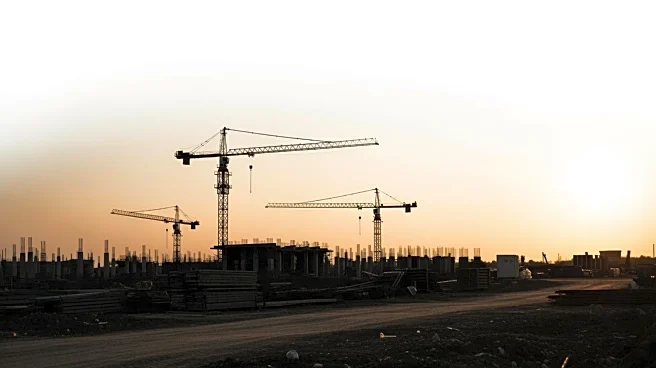What's Happening?
Vidi, a Coventry-based contractor specializing in residential construction, refurbishments, and conversions, has entered administration, leaving hundreds of creditors without expected payouts. The company,
which operated mainly in the Midlands and South of England, faced significant financial difficulties due to a combination of factors including Brexit, the Covid pandemic, global inflation, material shortages, and price increases caused by the war in Ukraine. According to a report by administrators at Horsfields, Vidi owed a total of £5.9 million to 227 trade and expense creditors, as well as £235,000 to HMRC. The firm’s 32 former employees are owed £366,000, which will initially be paid via the government’s Redundancy Payments Service, with 75% expected to be reimbursed through the administration process.
Why It's Important?
The administration of Vidi highlights the broader impact of Brexit and global economic challenges on the construction industry. The company's financial struggles reflect the difficulties faced by many businesses in navigating the post-Brexit economic landscape, compounded by the pandemic and geopolitical tensions. The loss of a key client in 2024 further exacerbated Vidi's situation, leading to unrecoverable debts and loss-making contracts. This development underscores the vulnerability of construction firms to external economic pressures and the importance of strategic financial management in maintaining solvency.
What's Next?
As Vidi ceases trading, creditors are unlikely to recover their debts, marking a significant financial loss for those involved. The administration process will continue to address employee claims through the Redundancy Payments Service. The construction industry may see increased scrutiny on financial practices and risk management strategies to prevent similar outcomes. Stakeholders, including suppliers and subcontractors, may seek legal recourse or adjust their business strategies to mitigate future risks.
Beyond the Headlines
The situation with Vidi raises questions about the long-term sustainability of construction firms in the face of economic uncertainty. Ethical considerations regarding employee treatment and creditor rights may come to the forefront as the industry evaluates its response to such challenges. The cultural impact of Brexit on business operations and the need for adaptive strategies in a changing economic environment are likely to be ongoing discussions.









